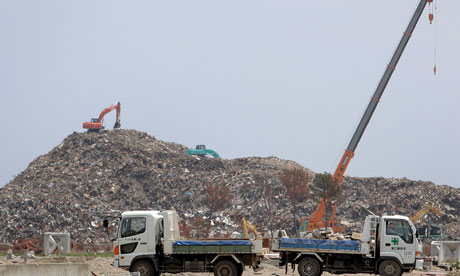By MITSURU OBE
TOKYO—The Japanese government proposed creating a financial safety net for beleaguered Tokyo Electric Power Co. to help it pay claims that could total more than $100 billion stemming from its damaged nuclear power plant—a proposal that drew support from investors but could face tough odds in Japan's deadlocked parliament.If it passes, the plan could keep the company—known as Tepco—from insolvency while sparing its lenders a painful restructuring. But in a shift, it also opens the door for higher electricity bills for consumers and businesses, in addition to contributions from the Japanese power and nuclear industries and backing from the Japanese government. Previously, government officials had appeared to rule out any rate increases to finance the rescue.
The government's plan didn't offer details on how much each would bear, suggesting fights over the final structure lie ahead. "The government will make sure that any costs passed on to consumers will be kept to a minimum," Minister of Economy, Trade and Industry Banri Kaieda said at a briefing.
Tepco shares soared on the news, climbing the 25% limit allowed for a single day, to close at ¥249 (about $3.11) in a strong rebound from a recent descent to an all-time low of ¥148 hit Friday. Tepco bonds, which have seen little trading due to their uncertain future, also rose strongly.
But the chairman of the Federation of Electric Power Companies of Japan gave a more guarded reaction, saying the utility lobby wants to see stronger justification for payments by other utilities to help finance the compensation payments. He said the group hopes its demands will be better reflected in parliamentary deliberations.
The main opposition party, the Liberal Democrats, also said it isn't necessarily in favor. Support from the opposition would be needed to ensure passage of the bill, but other legislation—including bills to help fund rebuilding after the devastating earthquake and tsunami that struck Japan on March 11 —has stalled as opposition lawmakers press for the ouster of unpopular Prime Minister Naoto Kan.
"It's a problematic scheme that demands payments from other power companies that aren't at fault, and holds [Tepco] accountable for limitless compensation," said Nobuteru Ishihara, LDP secretary general.
Under the plan, the government will create a special body to handle the claims, which estimated have put at up to ¥10 trillion, or $124 billion. It will have the authority to issue government-backed bonds and will repay the funds using future profits from Tepco, contributions from industry and potentially higher power bills. The government also said that it will stand behind the company if necessary and that it isn't considering bankruptcy.
The government said in a statement that it "has asked Tepco to seek cooperation from all stakeholders," which it said included shareholders, bondholders and lending banks. But it added that a decision on what constituted "cooperation" would be left to the new government body.
"It is not for the government to decide specific forms of cooperation between Tepco and the stakeholders," Shinsuke Kitagawa, head of a task force on nuclear damages compensation, said at a briefing.
Investors were reassured that the government's plan wouldn't mandate a wholesale restructuring of Tepco's loans or bonds. "We view this establishment of the framework as major progress. The scheme will allow Tepco to fulfill its responsibility to pay compensation costs without going bankrupt, which implies that bonds will avert a default," said Toshiyasu Ohashi, chief credit analyst at Daiwa Securities Capital Markets Co.
Analysts said that restrictions imposed Tuesday on the short-selling of Tepco shares also played a role in the sharp share price rise.
Tepco has already warned that it faces a dire financial future as it tries to cope with the cleanup from the disaster at the Fukushima Daiichi plant, which was heavily damaged by the March 11 earthquake and tsunami. It is also struggling to fill in large gaps in its generating capacity. Even after it brought on mothballed facilities, Tepco is expecting a shortfall of 10% over usual summer demand.
Tepco President Masataka Shimizu said that the utility is preparing for making compensation as quickly as possible, slightly more than three months after the quake and tsunami. "We hope the bill will be enacted as soon as possible," he said.
The legislation is based on a framework initially announced on May 13 as the government grappled with how to meet the multiple interests of those hit by the accident, the utilities customers, and the company's shareholders, bondholders and lenders.
An independent panel of outside experts that is scrutinizing Tepco's finances will meanwhile hold its first meeting Thursday. Mr. Kaieda said the panel will ensure Tepco sells assets and implement tough cost-cutting before seeking any public support.
—Judy Lam and Kana Inagaki contributed to this article.






